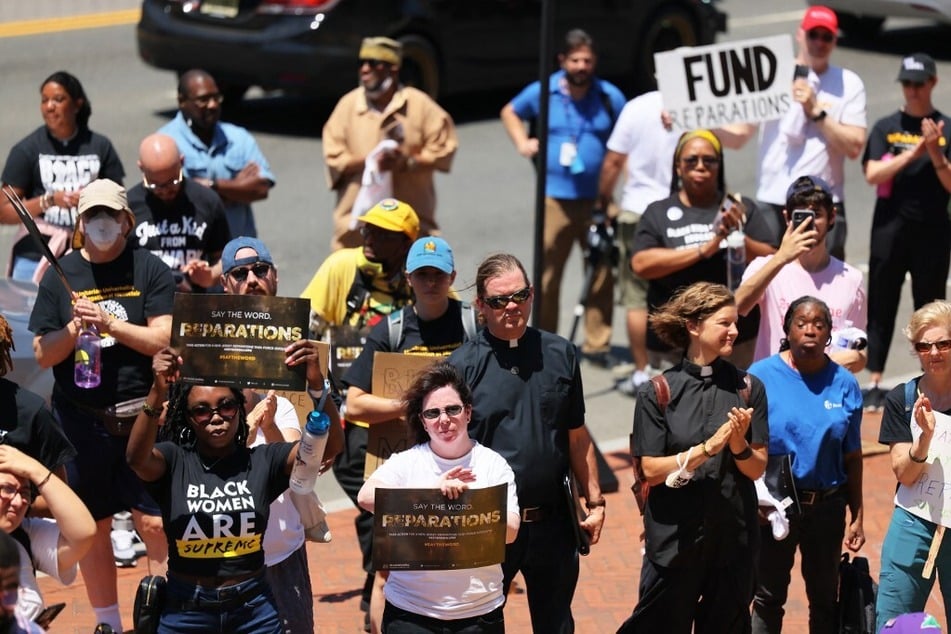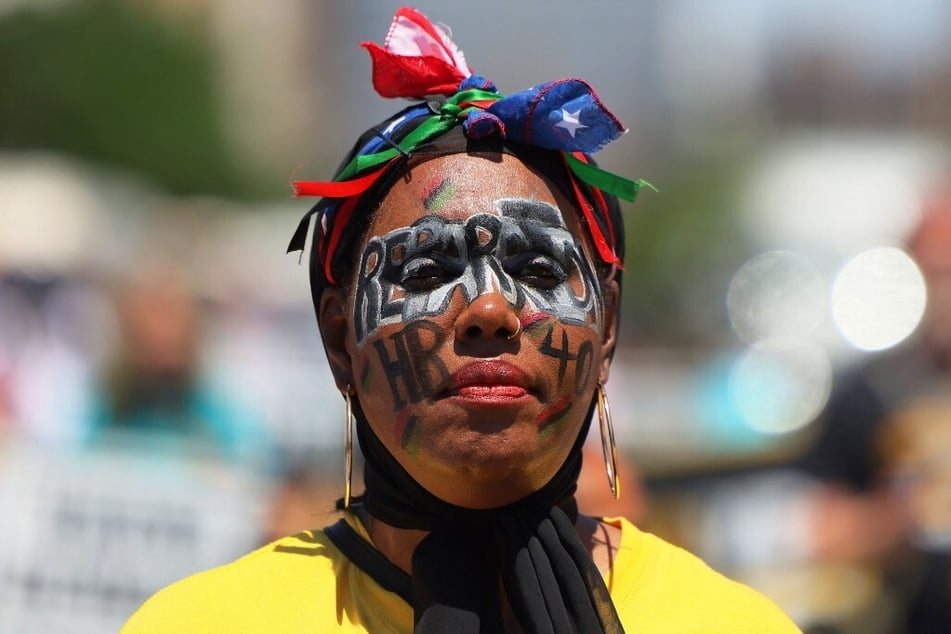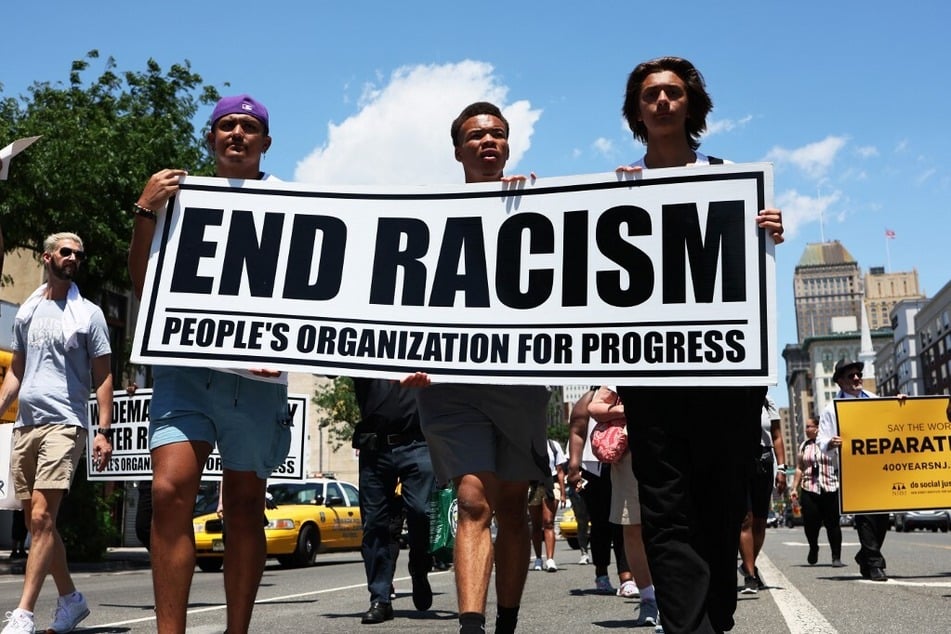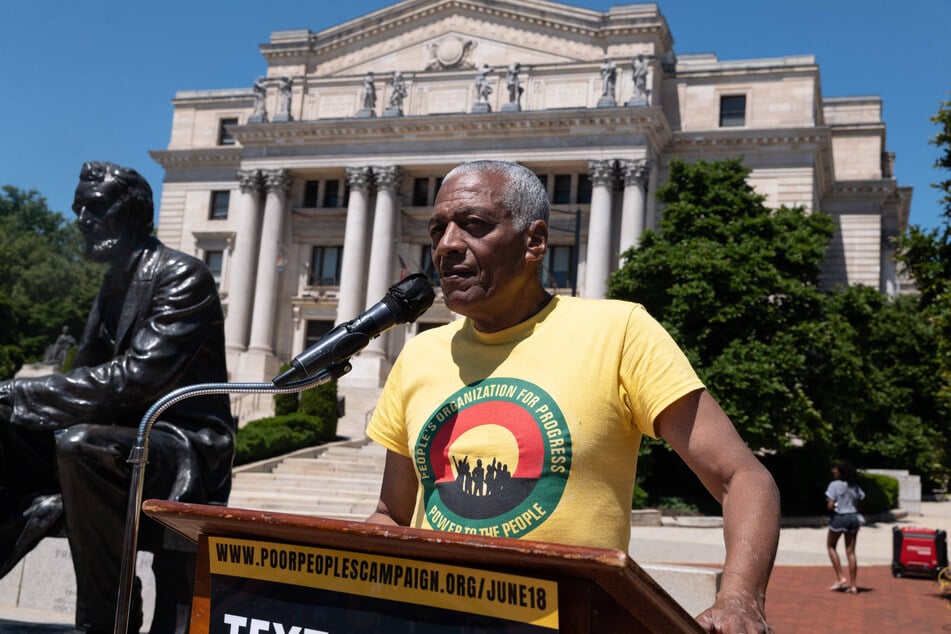New Jersey Reparations Council turns the spotlight on democracy in sixth public session
Newark, New Jersey - The New Jersey Reparations Council (NJRC) held its sixth public session on Monday considering how the state can make amends for centuries of anti-democratic harms to Black residents.

The NJRC was convened by the New Jersey Institute for Social Justice and launched on Juneteenth 2023. It consists of more than 55 experts organized into nine committees, all tasked with examining the state's legacy of enslavement and racial discrimination and developing a slate of policies to address those harms.
The NJRC has conducted five previous public sessions as it prepares to deliver a final report next Juneteenth:
- History of Slavery in New Jersey
- Segregation in New Jersey
- Faith and Black Resistance
- Health Equity
- Public Safety and Justice
A common thread across the conversations has been disentangling perceptions of the Garden State's "progressivism" from the reality of Black experiences. That theme continued during Monday evening's session on democracy.
"When you think about New Jersey, it's often associated with a Northern/progressive history and current-day politics, but the fact of the matter is that New Jersey has rather played an intermediary role with respect to the doling out of democratic benefits to its citizens. It has neither been Northern nor fully Southern, and for its Black residents, we have tended to occupy a kind of shadow land within New Jersey's democratic governance," committee co-chair Dr. Saladin Ambar opened.
"Historically, formally and informally, Black justice has been lagging sorely behind that of New Jersey's fully enfranchised citizens," the Rutgers University professor added.
History of Black disenfranchisement in New Jersey

Known as the "slave state of the North," New Jersey's history of anti-Black racism calls into question whether it has ever been a true democracy.
Black New Jerseyans first got the right to vote in 1776, but that liberty was quickly taken away again. Three years after an 1804 act for the "gradual abolition of slavery," the state enacted a law limiting the eligible voting population to tax-paying white men. The state constitution passed in 1844 also restricted suffrage to white men.
The right to vote was not restored until the 1870 ratification of the Fifteenth Amendment, which came after New Jersey opposed the Emancipation Proclamation and the Thirteenth Amendment's abolition of slavery.
Prohibitions on racial discrimination in voting were not enforced nationally until the 1965 Civil Rights Act, but that legislation still didn't fully protect Black New Jerseyans from attacks on political engagement.
"African Americans in New Jersey, like other states, were stripped of their basic rights for generations and then once legally restored, other informal mechanisms were employed to curtail their political rights, including the right to self-expression, to protest, and to be represented in state's leading political and social institutions," Ambar noted.
These historical harms include the loss of the rights to vote, to hold office, to be equally and fairly represented in their districts, to protest, to express opinions in the media, to be afforded equal rights and status in the state's political parties, and to be accurately counted in the US Census.
"The mechanism for oppression ran through a democracy that was for whites only, and so restoring the possibility of full freedom for Black people in the state of New Jersey also means reckoning with this history of illiberal democracy as we understand it," NJRC co-chair and Harvard University Professor Khalil Gibran Muhammad said.
New Jersey's anti-democratic legacy today

Today, there are still many laws and policies in place that disparately hurt Black voters at the ballot box and beyond.
Jesse Burns of the League of Women Voters of New Jersey laid out several of those contemporary threats, including ongoing resistance to passing legislation for same-day voter registration, enacting a state-level Voting Rights Act, and establishing independent commissions on redistricting as well as ending the county line, which organizes candidates on the ballot according to party endorsements.
Continuing to refuse voting rights to people behind bars further disenfranchises Black communities facing the brunt of predatory policing and mass incarceration. The New Jersey Institute for Social Justice has found that 59% of people who are denied the vote due to incarceration are Black, while Black New Jerseyans make up just 15% of the state's population.
"Our democracy is designed to suppress voters of color and has consistently invented new ways to ensure that power remains in the hands of white men," Burns said.
Faced with generations of pervasive discrimination, Black New Jerseyans have often had no choice but to take to activism to make their voices heard. Even then, they have faced extreme repression from state and local authorities.
"When Black New Jerseyans departed from formal mechanisms of political expression, at times because those channels did not allow for their voices to be meaningfully heard or because the brutal conditions required that they engage informally, they were met with unconstitutional practices and brutality from the state and local law enforcement and often times did not have their issues addressed in any meaningful or impactful way," said ACLU racial justice legal fellow Emahunn Campbell.
A fundamental question facing the committee is whether the First Amendment – which guarantees the freedoms of speech, press, and assembly as well as to petition the government for redress of grievances – actually protects Black people in New Jersey.
"The First Amendment itself has been a tool for defining the very basic protections that democracy affords its citizens and should be the basis of a reparations claim at this time," Muhammad explained, "precisely because it illustrates in very clear terms what is at stake in building a future of New Jersey that can embody the best traditions of multiracial democracy."
The fight for reparative justice in New Jersey

Limiting Black political expression has deepened racial disparities by denying communities of color representation that would further their economic and social interests. The reparations struggle itself is a case in point, as supposedly democratic structures have been repeatedly wielded to deny just claims for redress.
Larry Hamm, founder of the People's Organization for Progress, lamented lawmakers' failure to move forward S3164/A602 to create a state reparations task force. The legislation remains stalled, despite the state's Democratic trifecta in both chambers of the legislature and the governorship.
"If we achieve reparations, it won't be because of the democratic political system. It will be in spite of it," Hamm said.
"The question that faces us today is: How do we achieve reparations through a political system that was established, in fact, on the enslavement of our ancestors – a political system that not only was established but thrived on the exploitation of our ancestors?" he asked.
Hamm went on to lay out several strategies for building grassroots power behind a statewide reparations demand, including through public petitions, labor outreach, student conferences, and municipal commissions. If lawmakers still refuse to listen, he suggested bringing reparations directly before voters via a ballot initiative.
In wrapping up the conversation, attorney, author, and committee co-chair Madiba Dennie laid out three key policy categories the group will consider as it develops its reparations recommendations:
- enacting legal reforms to expand Black political power;
- providing monetary compensation for the historic and continued denial of Black political power; and
- providing monetary compensation for the crimes of enslavement.
"American democracy is at a turning point on a national scale where it can backslide into authoritarianism or push forward into an inclusive democracy," Dennie insisted. "Slavery is the anti-democratic reservoir into which American authoritarianism taps, and in order to achieve a real American democracy, slavery and all of its attendant circumstances must be stamped out. Doing so requires reparations."
"New Jersey was the last of the Northern states to abolish slavery, but here, it has the opportunity to lead the way."
Cover photo: MICHAEL M. SANTIAGO / GETTY IMAGES NORTH AMERICA / GETTY IMAGES VIA AFP

